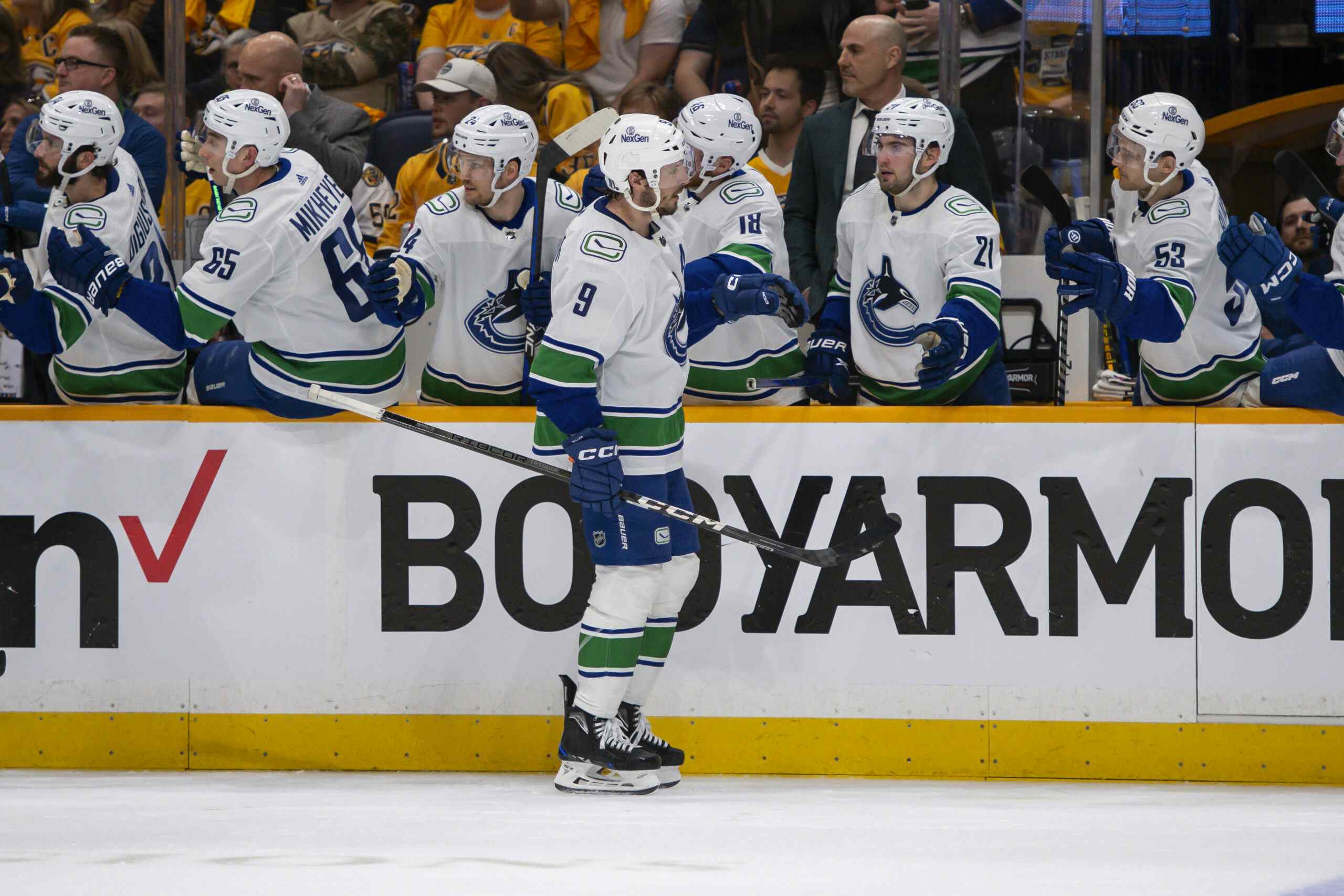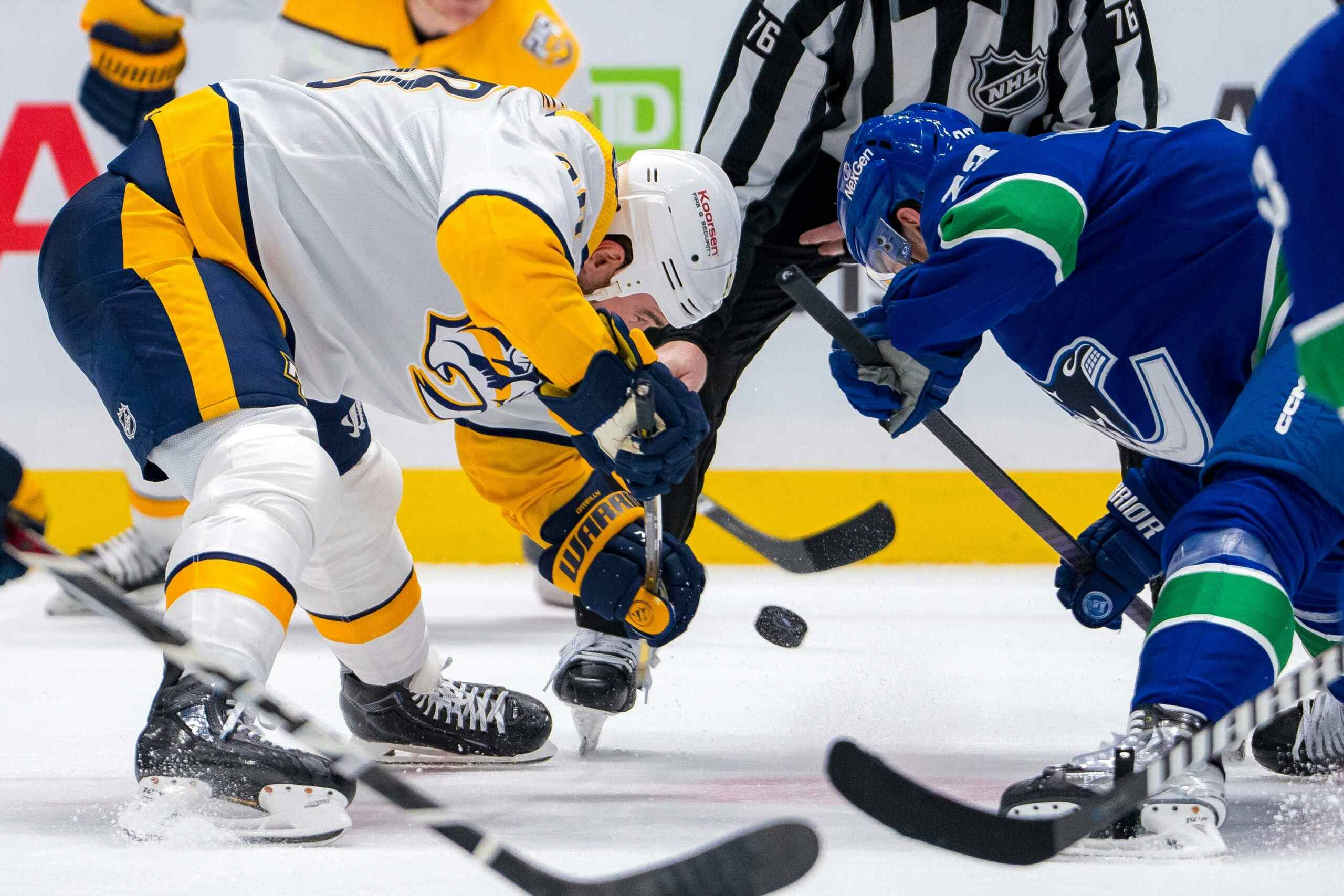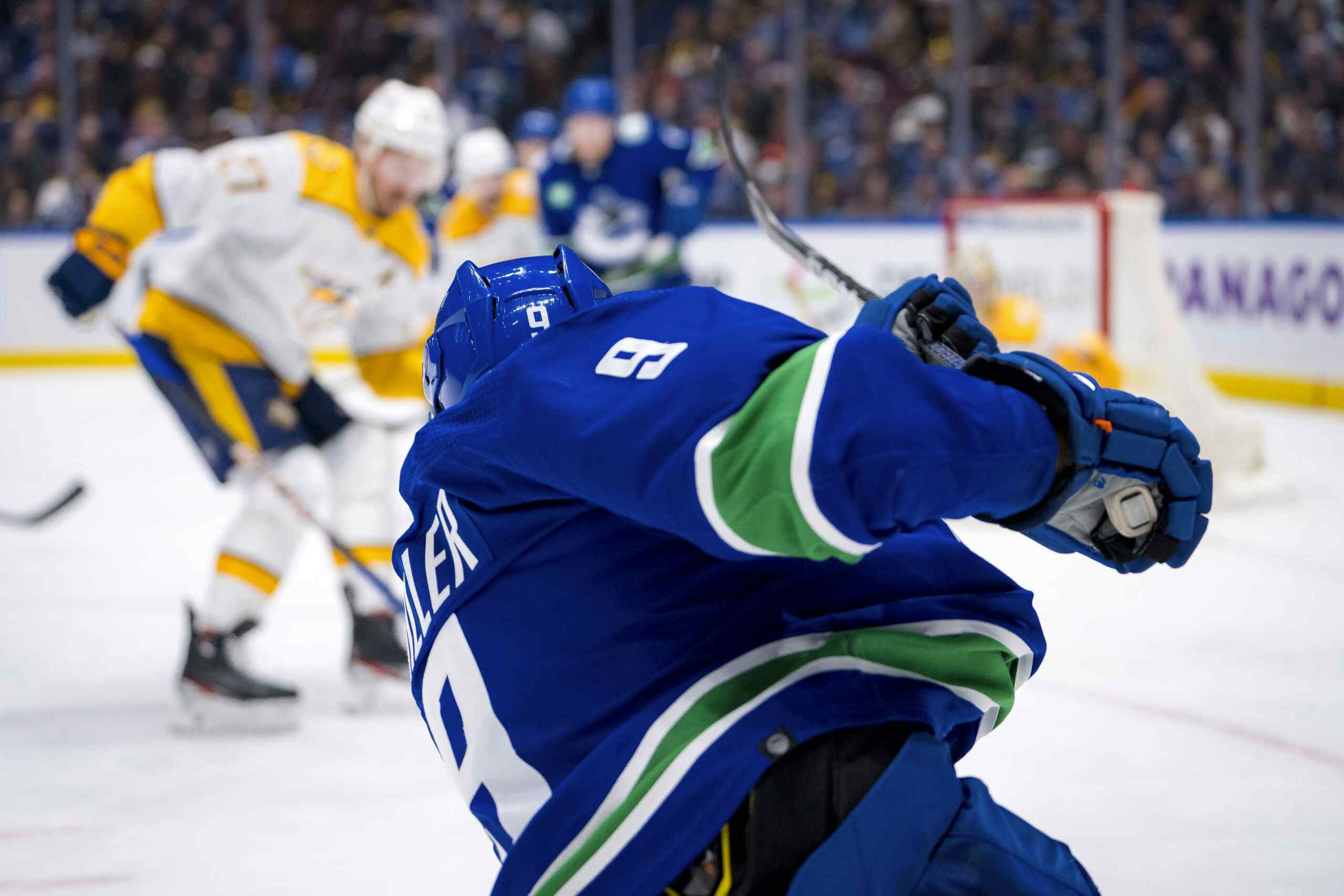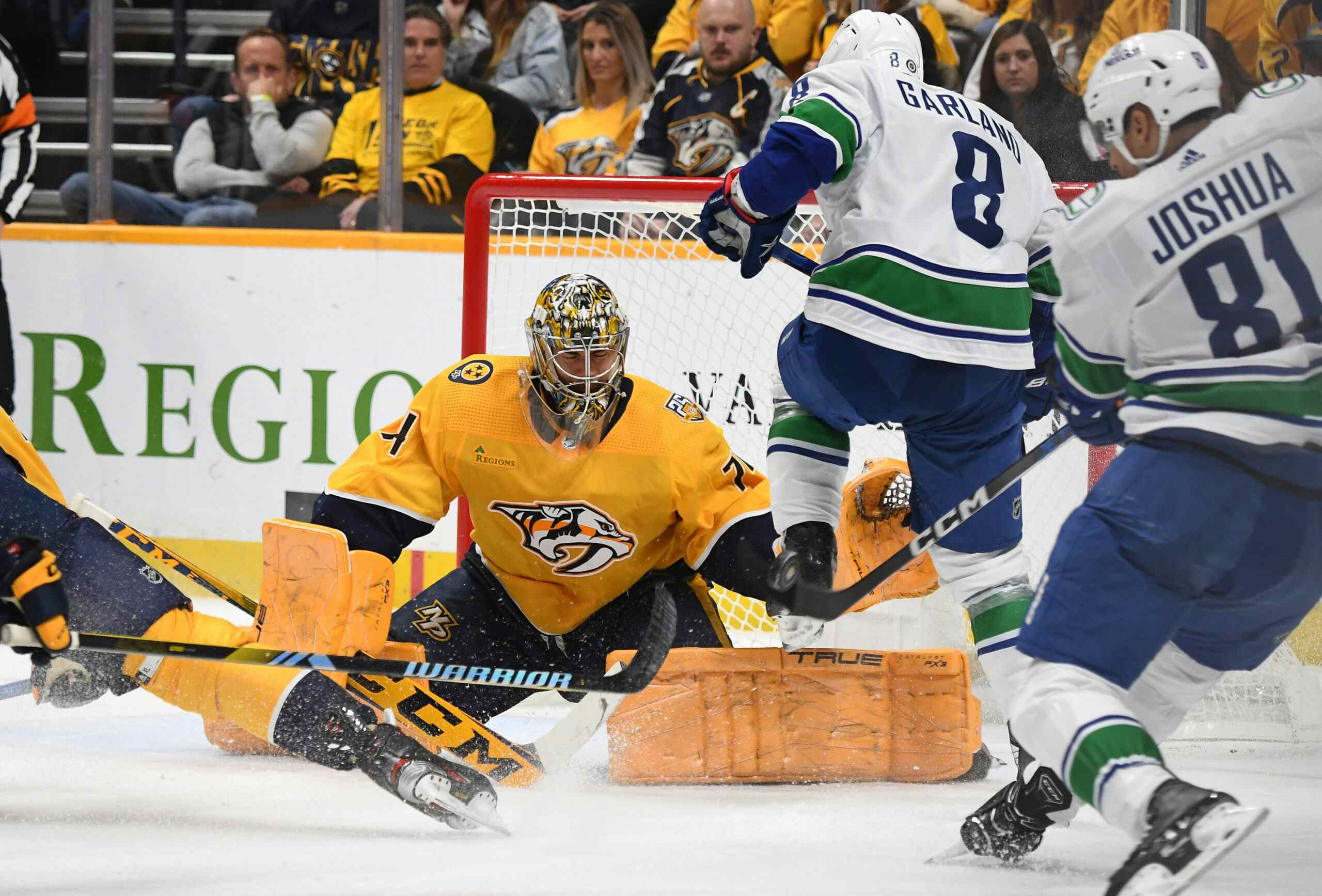Why Canucks fans are concerned about John Weisbrod’s influence
By J.D. Burke
8 years ago
(Image courtesy www.Flames.NHL.com)
It’s rare that a relatively low-profile assistant general manager finds himself in the crosshairs of fan anger, but John Weisbrod has been a lightning rod for criticism since he assumed the position last off-season.
Weisbrod’s body of work is such that there aren’t many talking points or red flags to draw from in his time as a Canuck. Canucks fans are generally pretty knowledgable and the hardcore among us have done their homework. It’s not so much what Weisbrod’s done, but what his past suggests he’s capable of doing with the Canucks.
Is this line of criticism fair, or is Weisbrod suffering guilt by association? Maybe a bit of both, but I’ll let his record speak for itself.
For The Record
Weisbrod cut his teeth in the hockey world first as a player, then an executive in the now-defunct IHL. When the IHL shutdown in 2000, a new opportunity opened with the owner of the Orlando Solar Bears elevating Weisbrod to an administrative position with the NBA’s Orlando Magic.
The Magic promoted Weisbrod to chief operating officer of their franchise, granting him oversight of the day-to-day operations of the franchise. Inklings of Weisbrod’s no-nonsense reputation are marked profoundly by his role in relieving Doc Rivers of his duties as head coach of the Magic. Magic general manager, John Gabriel, was next on the chopping block and received his walking papers a few months thereafter.
At the end of the Magic purge, it was Weisbrod who remained at the top, assuming the role of general manager in advance of the 2004-05 season. Weisbrod’s first and only season in that role can be described as nothing short of an unmitigated disaster, drawing enmity in the form of hand-written and delivered death threats to his residency.
Magic fans were especially irate about the decision to part ways with Tracy McGrady, as part of a seven-player mega trade to the Houston Rockets. If you were guessing that the move was justified by way of a Batman and Robin analogy, come on down…
“[McGrady]was one of the most talented players in the league, very popular, but I came to the conclusion he didn’t have the internal fortitude to win a championship,” Weisbrod said. “I went to the ownership and said, ‘He can be Robin, not Batman.’ The FBI moved me out of my house to a hotel under an alias [because of the public’s anger]”
Weisbrod’s one and only year as general manager of the Magic saw roster turnover bordering on scorched earth. Three players were left standing at the end of the 2004-05 season.
Ultimately Weisbrod – always a hockey guy first and foremost – resigned from his position within the Magic organization and returned to the world of professional hockey. The Dallas Stars took a flyer on Weissbrod, hiring him first as an amateur scout with jurisdiction over New England in advance of the 2005-06 season.
The Stars didn’t renew Weisbrod’s contract at the end of that season, but he was scooped up by the Bruins as a member of their scouting staff. Originally, Weisbrod was based out of Tampa, Florida, but he was elevated to the role of Director of Collegiate Scouting.
His work over this span, particularly with the Bruins, produces mixed results – although, we can’t know how much we can attribute each selection directly to Weisbrod’s influence. Culling the herd to include players selected specifically from college between 2005-11 doesn’t do Weisbrod any favours, though. Zane McIntye (sixth-round), Justin Florek (fifth-round) and Zach Trotman (seventh-round) were all college based draft prospects selected by the Bruins during his tenure.
The sample is small, but it yields 66-games of NHL action between the three. Hardly determinative in either direction, but worth mentioning.
Weisbrod’s six-year tenure with the Bruins spring boarded him onto Jay Feaster’s staff with the Calgary Flames. Feaster lauded Weisbrod’s intellect (Harvard educated man, diverse sets of experience) and outside the box thinking – citing, specifically, his affinity for detailed player tracking outside the realm of analytics.
Officially Weisbrod was the Flames’ assistant general manager of player personnel. In reality, his role encompassed scouting and personnel decisions alike. And this is where things get interesting.
A transaction by transaction approach may make intuitive sense, but it likely overstates the impact Weisbrod had on each decision. On the one hand, I could point to the Flames turning Jay Bouwmeester and Jarome Iginla into exactly zero NHL players as an example of mismanagement. I mean, they received two first-round selections and both look like long shots at this stage – important context, given Weisbrod’s oversight of the Flames scouting department.
On the other hand, the Flames did put together a favourable package with Boston, only to have Iginla’s no-trade clause stop that one in its tracks. It was a package that included Alexander Khokhlachev and Matt Bartkowski.
More consistent with Weisbrod’s role is the impact he had on scouting. A contemporary manifestation of this being the Canucks acquisitions of former Flames draft picks, Sven Baertschi and Markus Granlund. They make the first third of the Flames 2011 draft; a class well on its way to hitting on four of four skaters. Benning has admitted in no uncertain terms that he placed a great deal of trust in Weisbrod’s council when deliberating on these deals.
If anything related to Weisbrod’s time in Calgary is worth doubling down on, that’s it. The two drafts that follow him joining Calgary, however, not so much. Outside of Sean Monahan, who they selected sixth overall in 2013, there doesn’t appear to be much in the way of NHL talent. The selection of Keegan Kanzig, he of three points in his draft season, in the third-round of the 2013 Draft is especially pungent.
No one selection stands out as troubling like the one Calgary used 21st overall on Mark Jankowski in the 2012 draft, though. Jankowski, ranked as the 43rd best North American skater by Central Scouting Services in that draft, represented a reach for the ages – and one the Flames trade down (from the pick used to select Zemgus Girgensons) to make. The Flames, and Weisbrod in particular, felt they’d cheated the system and unearthed a player that projected to be the best of his class.
Assistant GM of player development John Weisbrod is Jankowski’s biggest supporter, arguing that the Flames should hold on to their first-round pick there was sentiment in the organization to deal it so they could land Jankowski.“He still has to cross those crocodile-infested waters, Weisbrod said Saturday after the NHL needed less than three hours to conclude rounds 2-7. “(During) the time period from getting drafted to being in the NHL, a lot can go wrong. Obviously that’s on his shoulders and our shoulders to develop him.”Still, Weisbrod said, “from a pure talent standpoint, to get a guy at No. 21 that’s as physically talented as anyone else in the draft, that makes you bullish. He’s capable of being that special kind of player.”
As the story goes, Weisbrod battled a brutal snowstorm to scout Jankowski and was enamored. This was his pick. His reputation on the line. Ultimately, it’s remembered in scouting and draft circles as one of the most puzzling and bizarre picks in recent memory. Though much has been made of his strong senior season in the NCAA, it doesn’t appear as though Jankowski’s long-term prospects are getting appreciably better with time, either.

Squandering a first-round selection is no small matter, especially for a franchise in transition, as the Flames were when they selected Jankowski in the 2012 Draft. At the very least, though, they added to their pool an asset with the potential for development. Jankowski probably isn’t something, but he isn’t nothing.
If nothing else, picking Jankowski represents a better use of assets than the picks they nearly squandered a season later when the Feaster-era Flames attempted to snag restricted free agent centre Ryan O’Reilly from the Colorado Avalanche by way of a two-year, $10-million offer sheet.
O’Reilly, who played 12-games with Metallurg Magnitogorsk of the KHL, would have been subject to waivers if the Flames were successful in completing their offer sheet. That would have cost the Flames their first and third-round selections in the draft that followed, and without them landing their player.
Although the Flames cited a misinterpretation of Article 13.23 of the collective bargaining agreement as the culprit, that excuse doesn’t necessarily pass the sniff test. Before the Flames submitted their O’Reilly offer sheet, the Red Wings tried to sign Evgeni Nabokov – a player that, like O’Reilly, had played KHL games that league year. Nabokov, having played games in another league, was subject to waivers and claimed by the New York Islanders.
Managerial malpractice of the Flames management group withstanding, Weisbrod was in the room when they filed that offer sheet. Even if he wasn’t personally responsible for doing the due diligence, it isn’t a good look. Lesser mistakes have cost the career of many a promising man.
Weisbrod’s Influence in Vancouver
I can’t speak to the leaguewide involvement assistant general managers have in the makeup of their rosters, but I can’t imagine Weisbrod is far behind, well, anyone. In free agency, the franchise added Adam Cracknell and Bartkowski – Weisbrod’s guys. In consecutive deadlines, the Canucks have surrendered futures for Flames draft picks, selected during Weisbrod’s tenure.
It’s not unfair to ask, given his history in dealing with the cap, what level of influence Weisbrod had on the Frankie Corrado situation earlier this season. The league walked the Canucks through the process of cutting down their training camp roster and they still fumbled the ball. Perhaps less costly, but every bit as embarrassing, was the failed first attempt at signing Nikita Tryamkin to his entry-level contract.
Given the Flames’ inability to secure fair and equitable packages for veterans on expiring contracts, it’s also fair to ask what impact Weisbrod had on the Canucks shortcomings at the trade deadline. Weisbrod, a scout by trade, inherited two selections and turned them into two long-shot NHL prospects, who at best will have a middling impact.
The body of work is incomplete, but concerning at every level. As a scout, there’s no real evidence Weisbrod is value added at the position. And to describe his public facing resume as an executive as ‘concerning’ is, frankly, probably a generous assessment.
Recent articles from J.D. Burke





